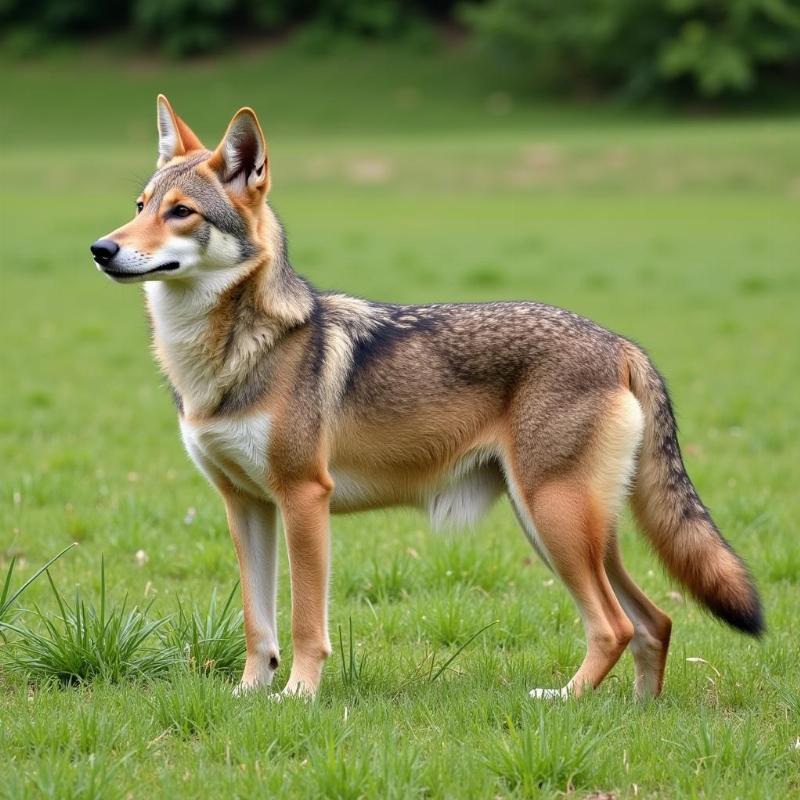Coyotes and dogs share a common ancestor, leading to many physical similarities. Understanding the coyote size comparison to dog can be crucial for pet owners, especially those living in areas where coyotes roam. Knowing the size difference can help you assess potential risks and take necessary precautions to protect your furry friend. This article will delve into the details of coyote size, compare them to various dog breeds, and offer practical safety tips for pet owners.
Just How Big are Coyotes?
Coyotes are generally smaller than most people imagine. Their size can vary depending on factors like geographical location and food availability. On average, an adult coyote stands about 20-25 inches tall at the shoulder and measures 32-43 inches in length from nose to tail tip. They typically weigh between 20 and 50 pounds, with males being slightly larger than females.
 Coyote Standing Profile
Coyote Standing Profile
Coyote Size Compared to Common Dog Breeds
Comparing a coyote’s size to common dog breeds offers a more relatable perspective. A coyote is roughly the size of a medium-sized dog, such as a Border Collie or an Australian Shepherd. However, they are generally smaller than large breeds like German Shepherds, Labradors, or Rottweilers.
Here’s a simplified comparison:
- Smaller than: German Shepherd, Labrador Retriever, Rottweiler, Great Dane
- Similar to: Border Collie, Australian Shepherd, English Springer Spaniel
- Larger than: Jack Russell Terrier, Chihuahua, Dachshund
Why is Knowing the Size Difference Important?
Understanding the coyote size comparison to dog is crucial for several reasons. Firstly, it allows pet owners to assess potential threats. While coyotes are not typically aggressive towards humans, they can view small dogs as prey. Knowing the size difference helps you determine if your dog might be vulnerable. Secondly, size comparison aids in identifying coyotes accurately. This is essential for reporting sightings and contributing to local wildlife management efforts.
Protecting Your Dog from Coyotes
While coyotes are naturally cautious of humans, encounters can still occur, especially in suburban areas. Here are some crucial tips to protect your dog:
- Never leave small dogs unattended outdoors, especially during dawn and dusk when coyotes are most active.
- Secure your yard with high fences. Coyotes are agile climbers and can scale surprisingly high fences.
- Keep your dog on a leash when walking in areas where coyotes are known to inhabit.
- Avoid leaving pet food outdoors. This can attract coyotes and other wildlife.
- Make noise if you encounter a coyote. Yelling, clapping, or using a noisemaker can scare them away.
Conclusion
Understanding the coyote size comparison to dog provides valuable context for pet owners. By recognizing the potential risks and implementing preventative measures, you can ensure your furry friend’s safety. Remember, awareness and proactive steps are key to coexisting peacefully with wildlife.
FAQ
- Are coyotes bigger than dogs? Generally, coyotes are smaller than large dog breeds but similar in size to medium-sized dogs.
- Can a coyote kill a dog? While not common, coyotes can prey on small dogs, especially if they are unsupervised.
- What should I do if I see a coyote in my yard? Make noise to scare it away, and ensure your pets are safely indoors.
- Are coyotes aggressive towards humans? Coyotes are typically wary of humans and avoid confrontation, but caution is always advised.
- How can I protect my small dog from coyotes? Never leave small dogs unattended outdoors, especially during dawn and dusk, and secure your yard with high fences.
Beautdogs.us is your premier online resource for all things dog-related in the USA. We offer expert advice on dog breeds, care, and products, catering to both novice and experienced dog owners. Our comprehensive guides provide valuable insights into responsible pet ownership, ensuring a happy and healthy life for your canine companion. Beautdogs.us is your trusted source for expert guidance on everything dog-related! Contact us today for personalized support: Email: [email protected], Phone: +1 501-555-7529.